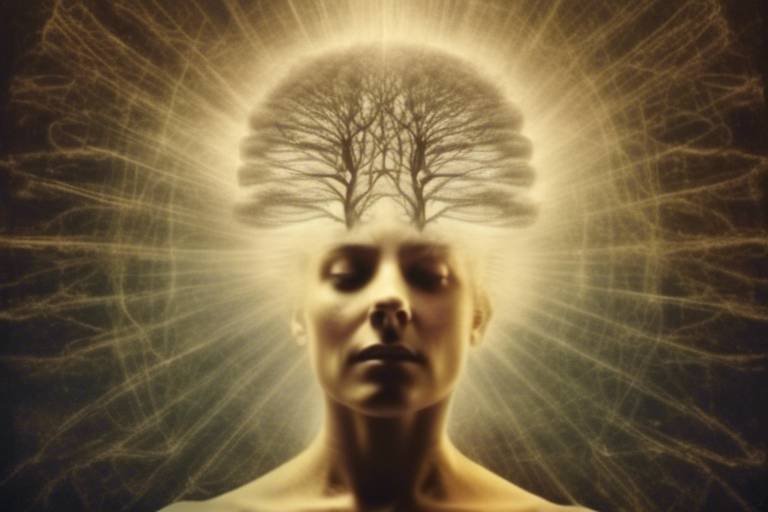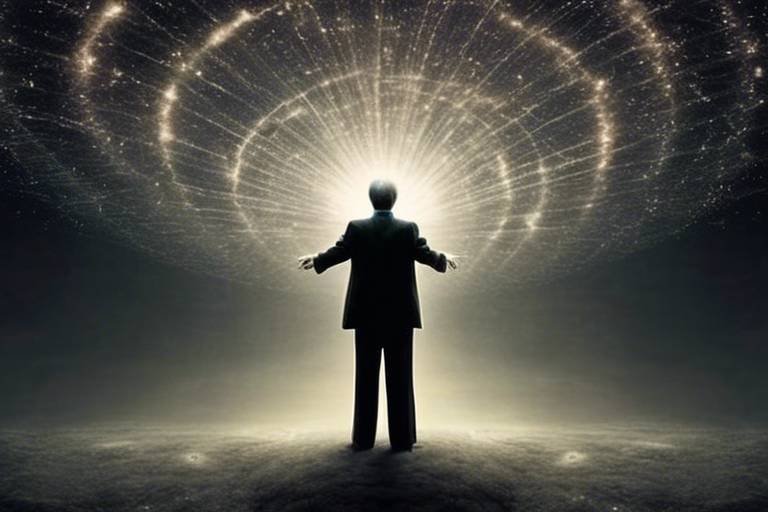The Influence of Ontology on Human Consciousness and Perception
Have you ever stopped to wonder how your understanding of existence shapes the way you see the world? Ontology, the study of being and existence, plays a crucial role in shaping our perception and consciousness. It acts as a lens through which we interpret our reality, influencing not just our thoughts but also our interactions with the world around us. In this article, we will explore the intricate dance between ontology, consciousness, and perception, diving deep into various theories and implications that resonate across philosophy, psychology, and cognitive science.
Ontology is more than just a philosophical term; it's a foundational aspect of how we navigate our lives. Imagine it as the framework for a house—without a solid foundation, the structure would crumble. In essence, ontology seeks to answer questions like: What does it mean to exist? What is the nature of reality? These questions are not merely academic; they directly influence our perception and consciousness. By understanding ontology, we can gain insights into how our beliefs about existence shape our experiences and the way we interact with others.
When we talk about consciousness, we’re diving into one of the most complex phenomena known to humanity. Consciousness encompasses awareness, thought, and perception, creating a rich tapestry of human experience. Think of it as the software running on the hardware of the brain—without it, we would be mere automatons. Various theories attempt to explain consciousness, from philosophical musings to scientific inquiries. Each perspective offers a unique lens, helping us understand the origins and nature of consciousness.
Philosophers have long grappled with the essence of consciousness. Their debates have given rise to several key theories, including dualism, materialism, and idealism. Each theory provides a different perspective on how consciousness relates to our existence. For instance, dualism posits that the mind and body are separate entities, while materialism argues that everything, including consciousness, can be explained through physical processes. Idealism, on the other hand, suggests that reality is fundamentally mental, pushing us to reconsider how we perceive the world around us.
The conflict between dualism and materialism highlights differing views on the mind-body relationship. Dualists argue that mental phenomena are non-physical and cannot be fully explained by material processes. This perspective raises intriguing questions about the nature of consciousness and its place in the universe. Materialists, conversely, contend that consciousness arises from brain activity, suggesting that our thoughts and perceptions are merely byproducts of biochemical processes. This clash of ideas has profound implications for how we understand human experience and consciousness.
Idealism posits that reality is fundamentally mental, proposing that our perceptions shape our experiences. This perspective can be likened to viewing the world through a colored lens—everything we see is tinted by our thoughts and beliefs. Understanding consciousness through the idealist lens invites us to explore how our mental states influence our perception of reality. Are we merely passive observers, or do we actively participate in shaping our experiences? This question lies at the heart of the idealist philosophy.
In the realm of psychology, various frameworks attempt to unravel the complexities of consciousness. Cognitive and behavioral approaches provide valuable insights into how we process information and interact with our environment. Cognitive theories focus on mental processes such as perception, memory, and decision-making, while behavioral theories emphasize observable actions and responses. These frameworks intersect with ontological concepts, revealing how our understanding of existence influences our cognitive processes and ultimately shapes our consciousness.
Perception is the process by which we interpret sensory information, acting as the bridge between our consciousness and reality. Our ontological beliefs significantly shape how we perceive the world, influencing everything from our emotional responses to our decision-making processes. For instance, someone who believes in a deterministic universe may perceive their choices as limited, while another who embraces free will may see countless possibilities. This divergence in perception underscores the profound impact of ontology on our everyday lives.
Cultural factors play a significant role in shaping perception. Different ontological beliefs across cultures can lead to varied individual and collective experiences. For example, in collectivist cultures, the emphasis on community and interdependence can influence how individuals perceive their roles and responsibilities. Conversely, in individualistic cultures, personal achievement and self-expression might take precedence. This cultural lens affects not only our perception of ourselves but also our interactions with others.
Recent advancements in neuroscience offer fascinating insights into the relationship between brain function and consciousness. As we delve deeper into the workings of the brain, ontological questions continue to intersect with scientific findings. For instance, understanding how neural networks contribute to conscious experience raises important questions about the nature of reality and perception. Are our experiences merely electrochemical signals, or is there something more profound at play? These inquiries challenge us to rethink our understanding of consciousness and its connection to ontology.
- What is ontology? Ontology is the study of being and existence, exploring the nature of reality and how it influences our perception and consciousness.
- How does ontology affect consciousness? Ontology shapes our beliefs about existence, which in turn influences our awareness, thoughts, and perceptions.
- What are the main philosophical theories of consciousness? Key theories include dualism, materialism, and idealism, each offering different perspectives on the mind-body relationship.
- How does culture influence perception? Cultural beliefs can shape how individuals perceive their roles, responsibilities, and interactions with others, leading to varied experiences.
- What role does neuroscience play in understanding consciousness? Neuroscience provides insights into how brain function relates to consciousness, raising important ontological questions about the nature of reality.

Understanding Ontology
Ontology, at its core, is the study of being and existence. It serves as a foundational framework that helps us grasp the nature of reality and the various ways it influences our perception and consciousness. Imagine ontology as a map that guides us through the intricate landscape of existence, helping us navigate the often murky waters of what it means to be alive and aware. This field of study raises profound questions: What is real? What does it mean to exist? How do our beliefs about existence shape our experiences and interactions with the world around us?
To dive deeper into ontology, we can break it down into several key components. Firstly, ontology examines different categories of being, such as objects, properties, and relations. This categorization helps us understand how various entities interact and coexist in the universe. For instance, consider the relationship between a tree and the environment it inhabits. The tree is not merely an isolated object; it is part of a broader ecological network that includes soil, air, and other living organisms. This interconnectedness is a vital aspect of ontology, emphasizing that existence is not a solitary experience but rather a web of relationships.
Furthermore, ontology challenges us to reflect on our own perceptions and beliefs. Our understanding of reality is often filtered through cultural, social, and personal lenses. For example, in some cultures, the concept of existence may be deeply intertwined with spiritual beliefs, while in others, it may be rooted in scientific understanding. This divergence in ontological perspectives can lead to vastly different interpretations of what it means to be human. As we explore ontology, we begin to recognize that our perceptions are not just individual experiences but are shaped by collective beliefs and values.
In the realm of philosophy, ontology intersects with various disciplines, including psychology, cognitive science, and even art. Each of these fields offers unique insights into the nature of existence and consciousness. For instance, cognitive science investigates how our brains process information and create our subjective experiences, while art often reflects deeper ontological questions about identity and reality. This interdisciplinary approach enriches our understanding of ontology, highlighting its relevance across different domains of human inquiry.
To summarize, ontology is not merely an abstract concept; it is a practical framework that shapes our understanding of existence and consciousness. By examining the categories of being, the influence of culture, and the interplay between various disciplines, we can gain a more profound appreciation for the complexities of life. As we continue to explore these ideas, we may find that our perceptions of reality are not fixed but are continually evolving, influenced by our experiences, beliefs, and the world around us.

The Nature of Consciousness
Consciousness is one of the most intriguing and elusive phenomena in human experience. It’s like trying to catch smoke with your bare hands—just when you think you’ve grasped it, it slips away. At its core, consciousness encompasses our awareness, thoughts, and perceptions. But what does that really mean? How do we even begin to unravel the complexities of something so inherently subjective?
To dive deeper into the nature of consciousness, we must explore various theories that have emerged over time. These theories attempt to answer fundamental questions like: What is consciousness? Where does it come from? And how does it shape our reality? Some argue that consciousness is a byproduct of brain activity, while others suggest it is a fundamental aspect of existence itself.
Philosophers throughout history have grappled with the essence of consciousness, leading to a rich tapestry of theories. Among these, dualism, materialism, and idealism stand out as key perspectives, each offering unique insights into the human experience.
The debate between dualism and materialism is particularly fascinating. Dualism, famously championed by René Descartes, posits that the mind and body are distinct entities. This perspective raises questions about the nature of consciousness: if the mind is separate from the body, how do they interact? On the flip side, materialism argues that everything, including consciousness, can be explained through physical processes. This view aligns with the scientific understanding of the brain as the seat of consciousness, suggesting that our thoughts and feelings are merely the result of neural activity.
Then we have idealism, which flips the script entirely. Idealists argue that reality is fundamentally mental, meaning that our consciousness shapes the world around us. Think of it like a painter creating a canvas; our perceptions and thoughts are the brush strokes that bring our reality to life. This perspective challenges us to reconsider the relationship between consciousness and the external world, suggesting that our experiences are not just passive observations but active creations of our minds.
Beyond philosophy, psychology offers a plethora of frameworks for understanding consciousness. Cognitive psychology, for instance, examines the mental processes that underlie our awareness and perception. It explores how we process information, make decisions, and form memories. Behavioral approaches, on the other hand, focus on observable behaviors and how they relate to our conscious experiences. These psychological theories often intersect with ontological concepts, revealing how our understanding of being influences our mental processes.
To illustrate this intersection, consider the following table, which summarizes key psychological theories and their connections to ontology:
| Theory | Focus | Connection to Ontology |
|---|---|---|
| Cognitive Psychology | Mental processes, awareness | Explores how consciousness shapes our understanding of reality |
| Behaviorism | Observable behavior | Highlights the role of environmental factors on consciousness |
| Phenomenology | Subjective experience | Emphasizes the importance of individual perception in shaping reality |
In conclusion, the nature of consciousness is a multifaceted topic that straddles the realms of philosophy and psychology. As we continue to explore these theories, we come closer to understanding not just what consciousness is, but how it influences our perception of reality. It’s a journey filled with questions, challenges, and perhaps even a few surprises along the way.
- What is consciousness? Consciousness refers to our awareness of ourselves and our environment, encompassing thoughts, feelings, and perceptions.
- How do different theories explain consciousness? Various theories, including dualism, materialism, and idealism, offer different perspectives on the relationship between the mind and body.
- What role does psychology play in understanding consciousness? Psychology provides frameworks for examining mental processes and behaviors, contributing to our understanding of consciousness.

Philosophical Perspectives
Philosophers have long grappled with the intricate nature of consciousness, pondering not just what it is but also how it relates to our understanding of reality. The discourse around consciousness is vast and varied, with several key theories emerging over centuries of philosophical inquiry. Among these, dualism, materialism, and idealism stand out as significant frameworks that provide distinct lenses through which we can view human experience.
Dualism, famously advocated by René Descartes, posits that the mind and body are fundamentally different substances. This perspective suggests that while our physical bodies operate within the confines of the material world, our minds exist in a separate realm of thought and consciousness. This separation raises intriguing questions about how these two realms interact. For instance, if the mind is non-physical, how does it influence our physical actions? Dualists argue that consciousness is an immaterial entity that cannot be fully explained by physical processes alone, thus inviting a rich exploration of the mind-body relationship.
On the other hand, materialism presents a contrasting view, asserting that everything, including consciousness, can be explained in terms of physical matter and processes. Materialists argue that our thoughts, feelings, and perceptions are the results of biochemical interactions within the brain. This perspective aligns closely with scientific inquiry, as it seeks to ground consciousness in observable phenomena. However, the challenge remains: if consciousness is merely a byproduct of brain activity, does that diminish the significance of our subjective experiences? This question fuels ongoing debates about the essence of consciousness and its place in our understanding of reality.
Then there’s idealism, a philosophy that flips the materialist view on its head. Idealists argue that reality is fundamentally mental; that is, the material world is a construct of the mind rather than an independent entity. This perspective leads to fascinating implications for our understanding of consciousness. If our perceptions shape reality, then consciousness becomes the very foundation upon which our experiences are built. This raises profound questions about the nature of existence: Are we merely observers in a world created by our thoughts, or is there an objective reality that exists independent of our consciousness?
To put it simply, these philosophical perspectives offer us a rich tapestry of ideas to ponder. They challenge us to consider not just what consciousness is, but how it interacts with the world around us. Each theory provides unique insights that can help us better understand the complexities of human experience. As we navigate through these philosophical waters, we must ask ourselves: What does it mean to be conscious? How do our beliefs about existence shape our perceptions and interactions with the world? These questions are not just academic; they resonate deeply with our everyday lives.
In summary, the philosophical discourse surrounding consciousness is not just an abstract debate; it is a profound exploration of what it means to be human. By examining dualism, materialism, and idealism, we can gain deeper insights into our own experiences and the nature of reality itself. The implications of these theories extend far beyond philosophy, influencing fields such as psychology and cognitive science, where the quest to understand consciousness continues to unfold.
- What is dualism? Dualism is the belief that the mind and body are two distinct entities that interact with each other.
- How does materialism explain consciousness? Materialism posits that consciousness arises from physical processes in the brain and can be fully explained through scientific inquiry.
- What is idealism? Idealism argues that reality is fundamentally mental and that our perceptions shape the world around us.
- Why is the philosophy of consciousness important? Understanding the philosophy of consciousness helps us explore the nature of human experience and the relationship between mind and reality.

Dualism vs. Materialism
When we dive into the philosophical waters of dualism and materialism, we find ourselves grappling with some of the most profound questions about the nature of consciousness and existence. At its core, dualism posits that the mind and body are fundamentally different substances. Think of it as two parallel tracks on a train line: the physical world of the body runs alongside the non-physical realm of the mind. This perspective, championed by philosophers like René Descartes, suggests that our thoughts, feelings, and consciousness exist independently of our physical form.
On the flip side, materialism argues that everything, including consciousness, can be explained in terms of physical processes. Imagine a complex machine where every cog and gear represents a different aspect of our being. Materialists believe that our thoughts and experiences are merely the byproducts of brain activity. This view is supported by advancements in neuroscience, which show that changes in brain states often correlate with changes in consciousness. So, when you feel happy or sad, it’s not just a whimsical occurrence; it’s tied to the electrical and chemical activity in your brain.
The tension between these two perspectives raises intriguing questions: If the mind is separate from the body, how do they interact? Can a purely physical brain give rise to subjective experiences? These questions are not just academic; they have real-world implications for our understanding of mental health, consciousness, and even artificial intelligence. For instance, if materialism holds true, it may lead us to pursue treatments for mental disorders that focus on altering brain chemistry. Conversely, if dualism is correct, we might need to explore therapies that address the mind’s non-physical aspects.
To illustrate the differences further, consider the following table that summarizes key distinctions between dualism and materialism:
| Aspect | Dualism | Materialism |
|---|---|---|
| Nature of Existence | Mind and body are distinct | Mind is a product of physical processes |
| Interaction | Mind influences body and vice versa | Body affects mind through brain activity |
| Implications for Consciousness | Consciousness exists independently | Consciousness is a brain function |
| Philosophical Proponents | René Descartes, Plato | David Hume, John Dewey |
In conclusion, the debate between dualism and materialism isn't just an academic exercise; it shapes how we understand ourselves and our place in the universe. Whether we lean towards the idea that our minds are separate from our bodies or that they are one and the same can influence everything from our mental health treatments to our views on artificial intelligence. As we continue to explore these ideas, it's essential to keep an open mind and consider the implications of each perspective on our understanding of consciousness.
- What is dualism? Dualism is the philosophical belief that the mind and body are two distinct entities that interact with each other.
- What is materialism? Materialism is the view that everything, including consciousness, is a result of physical processes and can be explained through science.
- How do dualism and materialism affect our understanding of consciousness? Dualism suggests consciousness exists independently, while materialism posits it is a byproduct of brain activity.
- Can the two perspectives coexist? Some philosophers argue for a middle ground, suggesting that while consciousness may arise from brain activity, it still has unique properties that merit further exploration.

Idealism and Consciousness
When we talk about idealism, we're diving into a philosophical pool where the mind takes center stage, and reality is often seen as a mental construct. Imagine for a moment that everything you perceive—every color, sound, and texture—is not just a product of the physical world but rather a manifestation of your consciousness. This perspective shifts the focus from external reality to the internal workings of the mind. Idealism suggests that what we consider 'real' is deeply intertwined with our thoughts and perceptions, making consciousness not just a byproduct of existence but a fundamental aspect of it.
One of the most fascinating implications of idealism is that it challenges the traditional notion of a separate, objective reality. Instead, it posits that our perceptions shape the world around us. Just think about it: when you look at a beautiful painting, the colors and shapes speak to you because of your unique experiences and mental associations. In this light, idealism argues that consciousness is the canvas upon which reality is painted.
Philosophers like Bishop Berkeley have famously stated, “To be is to be perceived.” This highlights the idea that existence itself relies on perception. If no one is there to perceive an object, does it really exist? This question not only challenges our understanding of reality but also emphasizes the importance of consciousness in shaping our experiences. In a world where idealism reigns, consciousness becomes the lens through which we interpret everything around us.
Moreover, idealism has significant implications for how we understand our interactions with the world. For example, if reality is a construct of our consciousness, then our beliefs, emotions, and thoughts can profoundly influence our experiences. This brings us to the idea of collective consciousness, where shared beliefs within a community can shape the perception of reality on a larger scale. Think about cultural rituals or traditions—these are not just practices; they are collective expressions of a shared consciousness that shape how members of the culture perceive their world.
In practical terms, this means that when we encounter different cultures or perspectives, we are not just engaging with different ideas but are also experiencing alternative realities shaped by their unique consciousness. This understanding can foster greater empathy and connection, as we realize that our perception of reality is just one of many.
Ultimately, idealism invites us to reconsider the nature of consciousness and its role in our lives. It pushes us to ask profound questions about existence, perception, and reality. Are we mere observers in a physical world, or are we active participants in creating our reality through consciousness? The answers to these questions may not only redefine our understanding of ourselves but also reshape how we interact with the world and each other.
- What is idealism in philosophy? Idealism is the philosophical belief that reality is fundamentally mental, and our perceptions shape what we consider to be real.
- How does idealism relate to consciousness? Idealism posits that consciousness is central to understanding reality, suggesting that our perceptions and thoughts create our experiences.
- What are the implications of idealism for cultural understanding? Idealism highlights how different cultures perceive reality based on their unique consciousness, fostering empathy and deeper connections.
- Who are some key figures in idealism? Notable philosophers include Bishop Berkeley and Immanuel Kant, who explored the relationship between perception and reality.

Psychological Theories of Consciousness
When we dive into the realm of consciousness, we quickly realize that it’s not just a simple flick of a switch. Instead, it's a complex tapestry woven from various threads of thought, experience, and scientific inquiry. offer fascinating insights into how we perceive ourselves and the world around us. These theories range from cognitive approaches that emphasize information processing to behavioral perspectives focusing on observable actions. Each theory provides a unique lens through which we can explore the intricate workings of the mind.
One of the most prominent theories in psychology is the cognitive theory of consciousness, which posits that consciousness arises from cognitive processes such as perception, memory, and decision-making. This perspective suggests that our conscious experience is a product of various mental functions working together. For instance, when you see a beautiful sunset, your brain processes the colors, remembers similar experiences, and evaluates the emotional significance of the moment—all of which contribute to your conscious awareness of that sunset. It's almost like a symphony, where different instruments come together to create a harmonious experience.
On the other hand, behavioral theories take a different route. They argue that consciousness is not something we can directly observe; instead, we should focus on observable behaviors as indicators of mental states. Think about it: if you see someone smiling and laughing, you might infer they're happy, even if you can't access their inner thoughts. This perspective raises intriguing questions about the relationship between consciousness and behavior. Can we truly understand what someone is feeling just by observing their actions? Or is there more to consciousness than meets the eye?
Moreover, the integration of ontological concepts into psychological theories adds another layer of complexity. For example, how does our understanding of existence influence our conscious experience? If we believe that reality is fundamentally mental, as suggested by idealism, our perception of the world could be dramatically different than if we adopt a more materialistic viewpoint. This interplay between ontology and psychology highlights the profound implications of our beliefs on our conscious experience.
To illustrate the diversity of psychological theories, let's take a look at a table summarizing some key frameworks:
| Theory | Description | Key Proponents |
|---|---|---|
| Cognitive Theory | Emphasizes the role of mental processes in understanding consciousness. | Jean Piaget, Ulric Neisser |
| Behavioral Theory | Focuses on observable behaviors as indicators of consciousness. | B.F. Skinner, John Watson |
| Phenomenological Approach | Explores subjective experiences and the essence of consciousness. | Edmund Husserl, Maurice Merleau-Ponty |
As we navigate through these theories, it becomes clear that consciousness is not a monolithic concept. Instead, it is a multifaceted phenomenon influenced by cognitive processes, observable behaviors, and our underlying beliefs about existence. Each perspective enriches our understanding and encourages us to question: What does it truly mean to be conscious? Are we merely the sum of our thoughts and actions, or is there something deeper at play?
In conclusion, the psychological theories of consciousness offer a rich tapestry of insights into how we experience the world. They challenge us to think critically about the nature of our thoughts, feelings, and actions. As we continue to explore these theories, we open ourselves to a deeper understanding of what it means to be human, illuminating the intricate relationship between our minds and the reality we inhabit.
- What is consciousness? Consciousness refers to the state of being aware of and able to think about one's own existence, thoughts, and surroundings.
- How do psychological theories explain consciousness? Different theories, such as cognitive and behavioral approaches, provide varying perspectives on the processes that contribute to conscious experience.
- What role does ontology play in understanding consciousness? Ontological beliefs shape our understanding of reality, which in turn influences our perception and experience of consciousness.

Perception and Reality
Perception is not just a passive reception of sensory inputs; it's an active process that shapes our understanding of reality. Imagine walking into a room filled with vibrant colors and sounds. Your brain doesn’t merely record these sensations; it interprets them, creating a unique experience that is influenced by your past experiences, beliefs, and even cultural background. This intricate dance between sensory information and cognitive processing raises intriguing questions about how we construct our reality.
The relationship between perception and reality is deeply intertwined with ontology—the study of being and existence. Our ontological beliefs act as a lens through which we interpret the world around us. For instance, if you believe that reality is primarily material, you may perceive the world in a more tangible, physical way. Conversely, if you lean towards an idealistic viewpoint, you might see reality as a construct of the mind, where thoughts and ideas shape your experiences. This divergence in perception can lead to vastly different interpretations of the same event or situation.
Consider how two people can witness the same sunset yet describe it in entirely different ways. One might focus on the stunning hues of orange and pink, while another might reflect on the emotional weight of the moment. This variance can be attributed to their individual ontological frameworks, which inform their perceptions and the meanings they derive from their experiences. Just like a painter uses different brushes to create varying textures on a canvas, our beliefs and experiences color how we perceive the world.
Moreover, cultural factors play a significant role in shaping perception. Different cultures have unique ontological beliefs that influence how individuals interpret their experiences. For example, in some cultures, the concept of time is linear, while in others, it is cyclical. This fundamental difference can lead to contrasting perceptions of events and experiences. A table below illustrates some of these cultural differences in perception:
| Culture | Ontological Belief | Perception of Time |
|---|---|---|
| Western Cultures | Materialism | Linear |
| Eastern Cultures | Holism | Cyclical |
| Indigenous Cultures | Spiritualism | Interconnected |
As we navigate through our daily lives, it's essential to recognize that our perceptions are not universal truths. They are shaped by a myriad of factors, including our ontological beliefs, cultural backgrounds, and personal experiences. By understanding this, we can cultivate a greater appreciation for the diversity of human experience and the various ways in which people interpret the world. It encourages us to engage in meaningful dialogues with others, fostering empathy and understanding, even when our perceptions differ.
In the realm of neuroscience, recent studies have revealed fascinating insights into how our brains process and interpret sensory information. The brain is not just a passive receiver; it actively constructs our perception of reality based on the information it receives. This means that our perceptions can be influenced by a range of factors, including mood, context, and even expectations. For instance, if you're feeling happy, you might perceive a situation more positively compared to when you're feeling down. This dynamic interplay between brain function and perception further emphasizes the complexity of how we experience reality.
Ultimately, the exploration of perception and reality invites us to question our understanding of the world. Are we merely observers, or are we active participants in shaping our reality? As we delve deeper into these philosophical and psychological inquiries, we can begin to unravel the intricate tapestry of consciousness and perception, leading to a richer understanding of ourselves and the world around us.
- What is the difference between perception and reality? Perception refers to how we interpret sensory information, while reality is the objective state of things as they exist, independent of our interpretations.
- How do cultural factors influence perception? Cultural beliefs and values shape the way individuals interpret experiences, leading to different perceptions of the same event.
- Can our perceptions change over time? Yes, perceptions can evolve based on new experiences, knowledge, and shifts in ontological beliefs.
- What role does neuroscience play in understanding perception? Neuroscience explores how the brain processes and interprets sensory information, revealing the complex mechanisms behind our perceptions.

Influence of Culture on Perception
Culture is like the lens through which we view the world; it colors our perceptions, influences our interpretations, and ultimately shapes our experiences. When we think about perception, we often imagine it as a straightforward process—our senses take in information, and our brains interpret it. However, culture plays a pivotal role in this process, acting as a filter that can alter how we understand and respond to our surroundings. For instance, consider how different cultures interpret colors. In Western cultures, white is often associated with purity and weddings, while in some Eastern cultures, it symbolizes mourning and funerals. This stark contrast illustrates how our cultural backgrounds can lead to vastly different perceptions of the same phenomenon.
Moreover, cultural narratives and symbols also shape our perceptions. For example, in cultures where community and collectivism are emphasized, individuals may perceive social interactions through the lens of harmony and group cohesion. Conversely, in more individualistic cultures, the focus may shift towards personal achievement and self-expression. This divergence can lead to different interpretations of behavior and intent, affecting everything from communication styles to conflict resolution. It raises the question: how much of what we perceive is shaped by our cultural context, and how much is universal?
To further illustrate this concept, let’s consider a few specific ways culture influences perception:
- Language: The language we speak can influence how we categorize and interpret experiences. For instance, certain languages have words that describe emotions or concepts that others do not, affecting how speakers of those languages perceive and express those feelings.
- Social Norms: Cultural norms dictate acceptable behaviors and responses, which can affect how we perceive social situations. What is considered polite in one culture may be perceived as rude in another.
- Art and Aesthetics: Different cultures have unique artistic traditions and standards of beauty that influence how we perceive art and even nature. For example, the appreciation of symmetry in Western art versus the value placed on asymmetry in some Asian art forms highlights this cultural influence.
In the digital age, the interplay between culture and perception has become even more complex. With the rise of social media and global communication, individuals are exposed to a multitude of cultural perspectives. This exposure can either broaden our understanding and appreciation of diverse perceptions or lead to cultural misunderstandings and stereotyping. The challenge lies in navigating this vast landscape of cultural influences while remaining open-minded and aware of our own biases.
In conclusion, the influence of culture on perception is profound and multifaceted. It shapes not only how we see the world but also how we interact with it. As we continue to explore the intricate relationship between culture and perception, it becomes increasingly clear that understanding this dynamic is essential for fostering empathy and communication in our increasingly interconnected world.
- How does culture affect our perception of reality?
Culture influences the frameworks through which we interpret sensory information, leading to different understandings of the same experiences. - Can perception change over time?
Yes, as cultures evolve and individuals are exposed to new ideas and experiences, their perceptions may also shift. - What role does language play in perception?
Language can shape thought processes and emotional expressions, thus affecting how individuals perceive and react to their environments.

Neuroscience and Ontology
In the realm of neuroscience, the intricate dance between brain function and consciousness opens up a fascinating dialogue with ontology. As we delve into this relationship, it becomes evident that our understanding of existence and reality is not merely a philosophical pursuit but a scientific one as well. Neuroscience aims to unravel the complexities of how our brains operate, while ontology seeks to define the very nature of being. Together, they create a rich tapestry that helps us comprehend how we perceive the world around us.
At the core of this exploration lies the question: What is consciousness? Neuroscientists have made significant strides in mapping the brain's neural pathways and understanding how these pathways contribute to conscious experience. For instance, studies using functional magnetic resonance imaging (fMRI) have shown that specific areas of the brain light up when we engage in conscious thought or sensory perception. However, the ontological implications of these findings are profound.
Consider the following points that illustrate the intersection of neuroscience and ontology:
- Mind-Body Problem: The classic philosophical dilemma regarding the relationship between mental states and physical processes is echoed in neuroscience. How can something as intangible as thought arise from the physical brain? This question continues to fuel debates about whether consciousness is a byproduct of brain activity or an independent entity.
- Neural Correlates of Consciousness: Neuroscientific research has identified specific brain regions associated with conscious experiences. However, identifying these correlates does not necessarily explain the essence of consciousness itself. This leads to further ontological inquiries about the nature of these experiences.
- Artificial Intelligence: As we develop advanced AI systems that mimic human thought processes, we are compelled to ask whether these machines can possess consciousness or understanding. This raises ontological questions about the nature of being and the criteria for consciousness.
The implications of these intersections are vast. For example, if consciousness is merely a product of neural activity, then what does that say about our subjective experiences? Are our perceptions simply the result of biochemical reactions, or is there something more profound at play? This is where ontology becomes crucial. It invites us to consider the essence of our experiences beyond mere physical explanations.
Moreover, advancements in neuroscience have also prompted a reevaluation of traditional ontological beliefs. The understanding that our brains can change and adapt—what we call neuroplasticity—challenges static views of existence. It suggests that our consciousness and perception are not fixed but are continuously shaped by our experiences, environment, and even our thoughts. This dynamic nature of consciousness adds layers to our ontological inquiries.
In summary, the relationship between neuroscience and ontology is a compelling area of study that invites us to rethink our understanding of consciousness. By examining how brain functions relate to our perceptions of reality, we can begin to grasp the deeper implications of existence itself. As we continue to explore these themes, we may uncover new insights that bridge the gap between the physical and the metaphysical, ultimately enriching our understanding of what it means to be human.
- What is the main focus of neuroscience in relation to consciousness?
Neuroscience primarily aims to understand how brain activity correlates with conscious experiences, exploring the neural mechanisms underlying awareness and perception. - How does ontology influence our understanding of consciousness?
Ontology provides a framework for examining the nature of being and existence, which helps inform philosophical discussions about the essence and origins of consciousness. - Can artificial intelligence possess consciousness?
This is a contentious topic; while AI can simulate certain cognitive functions, whether it can achieve true consciousness remains an open question that intertwines neuroscience and ontology. - What is neuroplasticity and its relevance to consciousness?
Neuroplasticity refers to the brain's ability to reorganize itself by forming new neural connections. This concept challenges static views of consciousness, suggesting that our experiences can shape our perceptions and understanding of reality.
Frequently Asked Questions
- What is ontology and why is it important?
Ontology is the philosophical study of being and existence. It’s crucial because it helps us understand the nature of reality, which in turn shapes our perceptions and consciousness. Without a clear grasp of ontology, our interpretations of experiences could be fundamentally flawed.
- How does consciousness relate to ontology?
Consciousness encompasses our awareness, thoughts, and perceptions, all of which are influenced by our ontological beliefs. Different ontological perspectives can lead to varying interpretations of what consciousness truly is, affecting how we experience reality.
- What are the main philosophical perspectives on consciousness?
Key philosophical perspectives include dualism, which posits a separation between mind and body; materialism, which argues that everything is physical; and idealism, which suggests that reality is fundamentally mental. Each perspective offers unique insights into the nature of consciousness and human experience.
- How do cultural factors influence perception?
Cultural beliefs and practices shape our perceptions significantly. Different cultures may have distinct ontological views that affect how individuals interpret sensory information and experience reality. This can lead to diverse worldviews and interactions.
- What role does neuroscience play in understanding consciousness?
Neuroscience provides empirical insights into how brain functions relate to consciousness. Recent findings help bridge the gap between ontological questions and scientific research, offering a more comprehensive understanding of how we perceive reality.
- Can ontology influence psychological theories?
Absolutely! Ontological beliefs can inform psychological theories about consciousness and perception. For example, understanding the nature of reality can shape cognitive and behavioral approaches, leading to different therapeutic strategies.
- Is consciousness purely a biological phenomenon?
This is a hotly debated question. While some argue that consciousness arises solely from biological processes (materialism), others believe that there are non-material aspects to consciousness that need to be considered, as suggested by dualism and idealism.
- How do different ontological views affect personal experiences?
Different ontological views can lead to vastly different personal experiences. For instance, someone who believes in a materialistic view may interpret events strictly through physical explanations, while someone with an idealistic view may find deeper meanings in experiences beyond the physical realm.



















